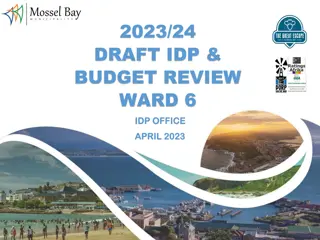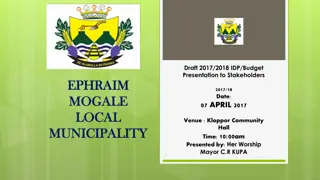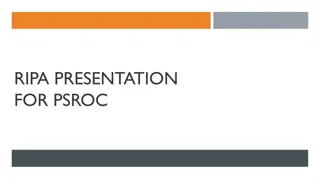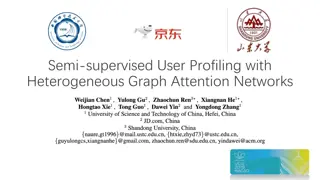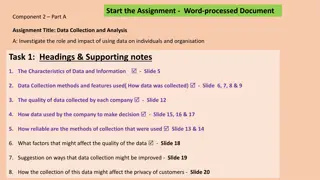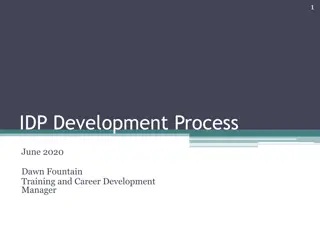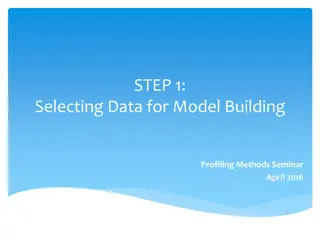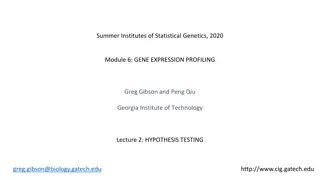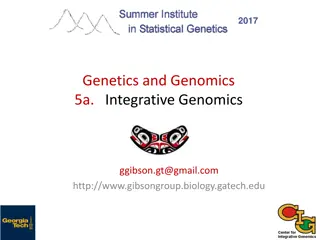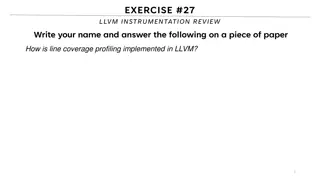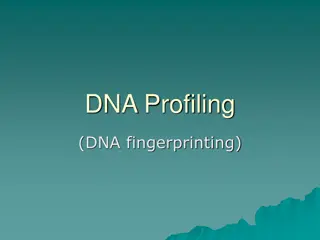Importance of Data Collection in Policy-Making for IDP Profiling
Understanding the significance of collecting data for policy-making is crucial, especially in the context of Joint IDP Profiling services. Profiling IDPs through collaborative data collection helps identify displaced individuals or groups, leading to targeted advocacy, protection, assistance, and eventual solutions to their displacement. Collaborative data approaches enhance impact, inform responses, and foster consensus, emphasizing the necessity of working together for effective outcomes.
Download Presentation

Please find below an Image/Link to download the presentation.
The content on the website is provided AS IS for your information and personal use only. It may not be sold, licensed, or shared on other websites without obtaining consent from the author. Download presentation by click this link. If you encounter any issues during the download, it is possible that the publisher has removed the file from their server.
E N D
Presentation Transcript
Data collection Generating an evidence base for policy-making Joint IDP Profiling Service Informing Solutions Together 1
Why do we need evidence? Why is data collection important for law and policy-making? 2
Informing an approach to data collection 3
What is profiling? Profiling is the collaborative process of identifying internally displaced groups or individuals through data collection, including counting and analysis, in order to take action to advocate on their behalf, to protect and assist them and, eventually, to help bring about a solution to their displacement. Source: OCHA/IDMC, Guidance on profiling IDPs, 2008 4
What is profiling? Collaborative process to reach consensus and increase impact of data If we don t come together on data, then we can t come together on programmes Data collection and analysis to target responses and inform solutions Context specific and adaptable methodology and approach OCHA policy head, ECOSOC 2015 Mixed methods approach, collecting quantitative and qualitative data for deeper analysis Local ownership means process as well as results has a tangible impact Results include core data disaggregated estimates by age, sex and diversity - and thematic analysis on issues such as needs, vulnerabilities and intentions 5
Why collaborate? Uses resources, skills and expertise Reduces need for multiple surveys Ownership of process Findings of interest and benefit to all: Government Organisations and clusters Platform for common understanding of situation Planning Funding 6
Country examples Afghanistan: Profiling on IDPs protection to inform development of policy on displacement Somalia: Durable solutions profiling to inform implementation of policy on IDPs 7
Initiation Profiling process can identify the need for a policy Initiation 9
Preparation Policy scope and shape determine the objectives of the profiling exercise Profiling to inform the technical processes of policy development such as defining an IDP Preparation 10
Drafting and consultation Profiling process and results to inform the content and priorities of the policy Drafting and consultation 11
Implementation and monitoring Establishing a baseline Informing an action plan to implement policy through measurable targets and indicators Follow-up profiling to monitor implementation against targets and indicators Frequency according to context and evolution of displacement situation Plan Implement Revise Monitor Implementation and monitoring 12
Profiling resources Joint IDP Profiling Service supports governments, humanitarian and development responders - www.jips.org Profiling Coordination Training (PCT) trains practitioners on the coordination of profiling in protracted displacement situations Guidance on profiling IDPs developed by OCHA and IDMC 14
Profile resources: Online toolkits Generic tools and guides to browse for assistance, inspiration and adaptation for all stages of a profiling exercise Online data management system to explore, analyse and report on displacement data collected during profiling exercises Online database where users can access and share tools and guidelines on profiling and assessment activities 15


